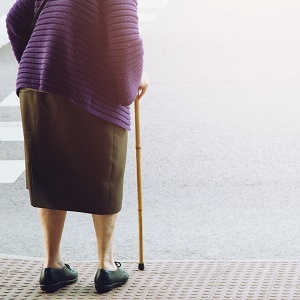
Extreme weather conditions can be a challenge if you're one of the millions of people around the world who live with a disability. Find out how to stay safe.
Roughly one in five people worldwide live with at least one disability – some were born with it, while it resulted from injury or illness in others.
In winter, heavy rain, snow, ice, fog and mist can cause severe weather conditions. However, having limited mobility doesn’t mean you need to limit your independence when cold weather strikes.
Here are some practical tips on dealing with impaired mobility and extreme winter weather:
Getting around: Live in an area that has snow in winter? Then you’ll know that getting around is especially difficult if you have impaired mobility or problems with balance. Keeping your footing in new, crunchy snow or on snow-covered grass isn’t too challenging. However, if snow on tarmac is trampled down or partly melted, it can be extremely slippery. Be mindful that old slippery snow may have fresh snow on top of it, so always proceed with caution if you’re using a mobility device like a walking stick, crutches or a wheelchair/mobility scooter.
Walking sticks: Conventional walking sticks provide little grip, so buy a stick with spikes to get around in icy weather, or a mobility walker that has four contact points for extra stability. Aim to stay close to walls or railings so you have something to hold onto if you slip. Always have a mobile phone in your pocket so you’re able to contact someone in an emergency.
Wheelchairs/mobility scooters: Wheelchairs and mobility scooters often vary in their ability to cope with snow, and cheaper models are usually too lightweight to grip properly in snow conditions. Rather ask for assistance instead of trying to operate them on your own.
If you operate a heavier wheelchair or mobility scooter, you may be able to get around in snow up to about 15-16cm. However, if snow is deeper, rather stay at home or, if you must go out, have a back-up plan in case your mobility device gets stuck.
Have your mobility scooter serviced before the start of winter, check tyres for wear and replace them with snow tyres if necessary, charge the scooter battery before leaving the house and also use a cover to ensure the control pain is protected from rain and snow. Mountain bike tyres or big knobby treaded tyres are good options for wheelchairs because they have better traction in snow.
Crutches: Avoid falls by asking someone to help you walk and open/close doors when it’s snowing. Make sure you have new rubber tips on the end of your crutches if they’re worn or get special spiked tips to deal with snowy weather. Invest in a good pair of snow-tread boots to enhance safety. Avoid stairs if possible, which are extremely dangerous when covered with snow.
Driving: Most people struggle to drive in snow. When you’re disabled, it’s even more difficult trying to cope, especially if your vehicle gets stuck and you’re unable to leave the car. Check that your vehicle is in good running order and fit snow tyres with special tread patterns designed to grip onto snow and ice.
Plan your journey beforehand in severe wintery weather. Inform people about your intended route, and ensure you know where to find traffic and travel information. Always check local and national weather forecasts. In particular, heed the latest weather warnings before going for a drive. The last thing you want to have is encountering the danger of an unexpected snow storm.
Remember that an automatic vehicle is more likely to lose its grip in snowy conditions. If you can't avoid going out in heavy snow, ask someone else to drive, preferably in a car with manual transmission.
Be prepared – make sure you have enough fuel and that your mobile phone is fully charged. Aside from packing in some food, a blanket, a hot drink and a supply of any essential medication you’re taking, have a survival kit. This should include matches, a flashlight, a shovel, water, flares and a sleeping bag.
At home:
- Stock up on food, essential medicines and toiletries so you don’t need to go out during very cold weather.
- If you have problems with power cuts in your area, ensure you have candles, matches and torches – just in case.
- Renew repeat prescriptions for your essential medications so you don’t run out.
- Make use of online shopping or find out about stores that are willing to deliver to your home.
- Try to keep your home warm. If it’s not possible to heat the whole house, heat your living area during the day and your bedroom just before going to sleep.
- Keep doors closed and draw curtains at dusk to block out draughts.
- As food is a vital energy source, eat well by having regular hot drinks and meals and keeping active indoors.
- Have a support network of at least three people you can contact in an emergency.
Sensible dressing
- Dress in layers with loose, lightweight, warm clothing instead of one bulky jacket or coat.
- Buy good-quality outer wear made from polypropylene or any man-made fibres. Wool is a good option as it maintains body temperature, even when wet.
- Avoid cotton as it stays wet and can result in hypothermia.
- Use lined gloves to keep hands warm. Better still: always carry a spare pair in case they get wet.
- Always wear a hat or cap on your head and wear a full head mask, helmet and neck warmers if you’re participating in outdoor sports.
- Keep your feet and ankles warm with boot warmers and leggings.
- If rain is expected, take along a raincoat and wear high-visibility clothing when it’s overcast or dark.




 Publications
Publications
 Partners
Partners










